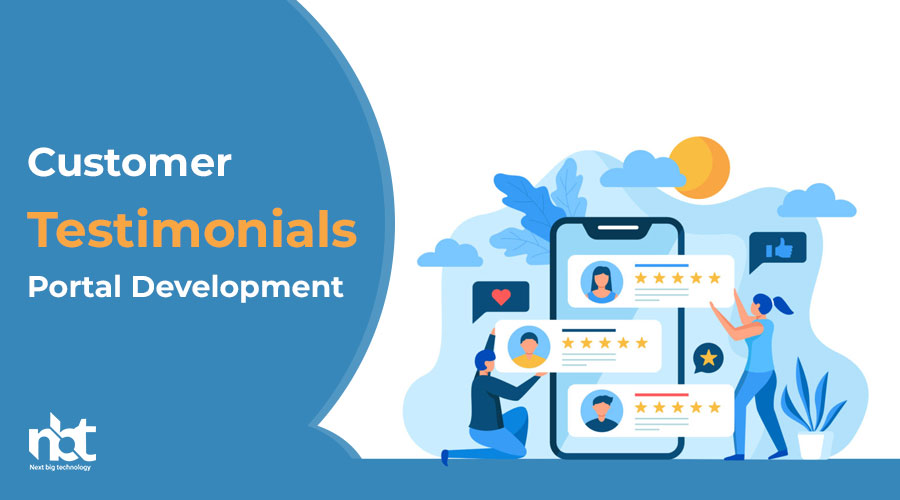Table of Contents
Customer testimonials portal development Services
In today’s highly competitive market, building trust and credibility with your target audience is paramount for the success of your business. One of the most effective ways to establish trust and credibility is through customer testimonials. These powerful endorsements provide social proof of the quality and reliability of your products or services, ultimately influencing the purchasing decisions of potential customers.
However, managing and showcasing customer testimonials can be a challenging task, especially as your business grows and accumulates more satisfied customers. This is where customer testimonials portal development services come into play. By leveraging the expertise of professionals in the field, you can create a dynamic and user-friendly platform to collect, manage, and display customer testimonials effectively.
Here are some key benefits of investing in customer testimonials portal development services:
- Centralized Platform: A dedicated testimonials portal serves as a centralized platform where you can gather and organize testimonials from various sources, including emails, social media, and review websites. This makes it easier to manage and update testimonials regularly.
- Enhanced Credibility: Having a well-designed testimonials portal enhances the credibility of your brand. When potential customers visit your website and see authentic testimonials from satisfied clients, they are more likely to trust your business and make a purchase.
- Improved Conversion Rates: Testimonials act as powerful social proof that can significantly impact conversion rates. By prominently featuring positive testimonials on your website, you can reassure hesitant customers and encourage them to take action.
- Engagement and Interactivity: A testimonials portal can also include features that promote engagement and interactivity, such as rating systems, comment sections, and sharing options. This encourages customers to interact with your brand and share their experiences with others.
- SEO Benefits: Incorporating customer testimonials into your website can also have positive implications for your search engine optimization (SEO) efforts. Fresh and relevant content, such as customer reviews, can improve your website’s visibility in search engine results pages.
When considering customer testimonials portal development services, it’s essential to partner with a reputable and experienced provider who understands your business goals and target audience. They should have expertise in designing intuitive user interfaces, implementing robust security measures, and integrating the portal seamlessly with your existing website.
How to Create a Customer testimonials portal development
In today’s digital age, customer testimonials play a pivotal role in establishing credibility and trust for businesses. Potential customers often rely on the experiences and opinions of others before making purchasing decisions. Thus, having a dedicated customer testimonials portal can significantly enhance your brand’s reputation and influence. If you’re considering creating your own customer testimonials portal, you’re in the right place. In this guide, we’ll walk you through the step-by-step process to develop a robust platform that showcases your customers’ positive experiences.
- Define Your Objectives: Start by clearly outlining the objectives of your testimonials portal. Determine what you aim to achieve with this platform, whether it’s to enhance credibility, increase conversions, or improve customer engagement.
- Choose the Right Platform: Selecting the appropriate platform for your testimonials portal is crucial. You can opt for content management systems like WordPress, which offer customizable templates and plugins tailored for testimonial display. Alternatively, you may choose to develop a custom solution based on your specific requirements.
- Design and User Experience: Design an intuitive and visually appealing interface for your portal. Ensure easy navigation and seamless user experience to encourage visitors to explore and engage with the testimonials. Keep the design clean and clutter-free, focusing on highlighting the testimonials effectively.
- Collect Testimonials: Actively seek feedback and testimonials from your customers. You can reach out via email, surveys, or feedback forms on your website. Encourage customers to share their experiences by offering incentives or rewards for their participation.
- Moderation and Verification: Implement a moderation process to ensure the authenticity and relevance of the testimonials. Verify the legitimacy of each testimonial before publishing it on your portal. This helps maintain credibility and prevents the inclusion of fake or misleading reviews.
- Categorization and Tagging: Organize testimonials into relevant categories or tags based on product/service type, customer demographics, or specific features. This makes it easier for visitors to find testimonials that resonate with their interests or needs.
- Integration with Existing Platforms: Integrate your testimonials portal with other marketing channels and platforms such as your website, social media profiles, and email campaigns. This ensures maximum visibility and exposure for your positive customer feedback.
- Optimize for SEO: Optimize your testimonials portal for search engines to improve its discoverability. Use relevant keywords in testimonial titles, descriptions, and meta tags. Additionally, ensure fast loading times, mobile responsiveness, and secure browsing to enhance user experience and SEO performance.
- Encourage Interaction and Sharing: Enable features that allow visitors to interact with testimonials, such as liking, commenting, or sharing them on social media. This not only fosters engagement but also amplifies the reach of your testimonials beyond your portal.
- Monitor and Analyze Performance: Continuously monitor the performance of your testimonials portal using analytics tools. Track metrics such as visitor engagement, conversion rates, and referral sources to gain insights into its effectiveness. Use this data to refine your strategies and optimize the portal for better results.
Why Should You Go for Customer testimonials portal development
In the ever-evolving landscape of online commerce, businesses are constantly seeking innovative ways to gain credibility and trust from their target audience. One such powerful tool that has emerged as a game-changer is the development of customer testimonials portals. These portals serve as a platform for customers to share their experiences and opinions about a product or service, and they can have a profound impact on the success of your business. Here’s why you should consider investing in customer testimonials portal development:
1. Authenticity and Credibility: Customer testimonials are invaluable social proof that can significantly enhance the credibility of your brand. When potential customers see positive reviews and testimonials from real people, they are more likely to trust your business and make a purchase. A dedicated testimonials portal provides a centralized space for these authentic voices to be heard, reinforcing the trustworthiness of your brand.
2. Enhanced Customer Engagement: By providing customers with a platform to share their feedback, you are inviting them to actively engage with your brand. This not only strengthens the bond between you and your customers but also demonstrates that you value their opinions and experiences. Engaged customers are more likely to become loyal advocates for your brand, leading to increased customer retention and advocacy.
3. Valuable Insight and Feedback: A testimonials portal is not just a tool for showcasing positive reviews; it also serves as a valuable source of feedback for your business. By closely monitoring customer testimonials, you can gain insights into areas where your products or services excel and identify areas for improvement. This feedback loop is essential for refining your offerings and delivering a better experience to your customers.
4. SEO Benefits: Customer testimonials can also contribute to your search engine optimization (SEO) efforts. User-generated content such as reviews and testimonials are considered highly relevant by search engines, and a well-optimized testimonials portal can improve your website’s visibility in search results. Additionally, incorporating keywords and phrases from customer testimonials into your website content can help boost your rankings for relevant search queries.
5. Competitive Advantage: In today’s competitive marketplace, businesses need to differentiate themselves from the competition. A testimonials portal can be a powerful differentiator, showcasing the unique value proposition of your products or services through the experiences of satisfied customers. By highlighting what sets you apart from competitors, you can attract more customers and establish yourself as a leader in your industry.
Market Prospects of Customer testimonials portal development and Platforms
In today’s digital age, businesses thrive on credibility and trust. As consumers increasingly turn to online reviews and testimonials to inform their purchasing decisions, the importance of a robust customer testimonials portal cannot be overstated. This demand has sparked a significant market opportunity for companies specializing in the development and provision of such platforms.
Understanding the Market Dynamics:
The market for customer testimonials portal development and platforms is witnessing a steady rise, driven by several key factors. Firstly, businesses across industries recognize the impact of positive customer feedback on their brand reputation and sales. Consequently, there is a growing emphasis on collecting, managing, and showcasing testimonials effectively.
Moreover, the proliferation of e-commerce and online services has intensified competition, making it imperative for businesses to differentiate themselves. A compelling testimonials portal serves as a powerful tool for building credibility and gaining a competitive edge in the market.
Key Features Driving Demand:
Customer testimonials portals offer a range of features designed to enhance user experience and maximize the impact of reviews. These include:
- Easy Integration: Seamless integration with existing websites and e-commerce platforms, ensuring a hassle-free setup process for businesses.
- Customization Options: Flexible customization options allow businesses to tailor the look and feel of their testimonials portal to align with their brand identity.
- Multi-Channel Collection: Support for collecting testimonials from various channels, including websites, social media, email, and more, ensures comprehensive coverage.
- Rich Media Support: Ability to incorporate diverse media formats such as text, images, videos, and audio testimonials, enriching the user experience and credibility.
- Analytics and Insights: Advanced analytics tools provide valuable insights into customer sentiment, engagement metrics, and trends, empowering businesses to make informed decisions.
Emerging Trends and Opportunities:
The market for customer testimonials portal development is evolving rapidly, driven by emerging trends and technological advancements. Some notable trends include:
- AI-Powered Solutions: Integration of artificial intelligence and machine learning algorithms to analyze and categorize testimonials, extract insights, and personalize user experiences.
- Blockchain-Based Verification: Utilization of blockchain technology to enhance the authenticity and security of testimonials, mitigating the risk of fraudulent or fake reviews.
- Voice of Customer (VoC) Integration: Seamless integration with Voice of Customer (VoC) platforms, enabling businesses to capture real-time feedback and convert it into actionable insights.
- Mobile Optimization: Increasing focus on mobile optimization to cater to the growing number of users accessing testimonials portals via smartphones and tablets.
Challenges and Considerations:
While the market for customer testimonials portal development presents lucrative opportunities, it is not without its challenges. Some key considerations for businesses operating in this space include:
- Data Privacy and Security: Ensuring compliance with data privacy regulations such as GDPR and CCPA to protect customer information and maintain trust.
- Content Moderation: Implementing robust content moderation mechanisms to prevent the publication of fake or inappropriate testimonials that could damage brand reputation.
- Integration Complexity: Addressing the challenges associated with integrating testimonials portals with existing systems and platforms, particularly for large enterprises.
Essential Features of a Customer testimonials portal development
In today’s digital age, customer testimonials hold immense power in shaping the perception of a brand. A well-crafted testimonials portal can be a game-changer for businesses, allowing them to showcase their credibility and build trust with potential customers. However, developing such a portal requires careful planning and attention to detail. Here are some essential features that every customer testimonials portal should incorporate:
- User-friendly Interface: The key to a successful testimonials portal lies in its usability. It should be intuitive and easy to navigate, allowing users to quickly find the information they’re looking for. A clean and modern design enhances the user experience, making it more engaging and compelling.
- Seamless Integration: The testimonials portal should seamlessly integrate with the existing website or platform of the business. This ensures consistency in branding and provides a cohesive user experience across all touchpoints.
- Multiple Display Options: Different businesses have unique needs when it comes to showcasing testimonials. Therefore, the portal should offer various display options such as grid view, carousel, or slider, allowing businesses to choose the format that best suits their requirements.
- Filtering and Sorting: With an abundance of testimonials, it’s essential to provide users with tools to filter and sort them based on different criteria such as date, rating, or category. This makes it easier for users to find relevant testimonials that resonate with their interests.
- Rich Media Support: In addition to text-based testimonials, the portal should support rich media formats such as images, videos, and audio recordings. This allows customers to share their experiences in a more vivid and compelling manner, enhancing the credibility of the testimonials.
- Social Proof Integration: Incorporating social proof elements such as social media mentions, ratings, and reviews can further bolster the credibility of the testimonials. Integration with popular social media platforms enables businesses to leverage their social presence and amplify the impact of customer feedback.
- Mobile Responsiveness: With the increasing prevalence of mobile devices, it’s crucial for the testimonials portal to be fully responsive and optimized for mobile viewing. This ensures that users can access and engage with testimonials seamlessly across devices, enhancing accessibility and user satisfaction.
- Security and Privacy: Protecting customer data and ensuring privacy should be a top priority for any testimonials portal. Implementing robust security measures such as encryption and data anonymization instills trust and confidence among users, encouraging them to share their feedback openly.
- Analytics and Insights: Tracking and analyzing user engagement with testimonials provides valuable insights into customer preferences and behavior. Integration with analytics tools enables businesses to monitor performance metrics such as conversion rates, engagement levels, and user demographics, allowing them to optimize the portal for maximum effectiveness.
- Customization Options: Every business has its unique branding and identity. Therefore, the testimonials portal should offer customization options such as branding colors, fonts, and styling to align with the overall look and feel of the brand.
Advanced Features Customer testimonials portal development
In the fast-paced digital landscape, businesses are continually seeking innovative ways to establish trust and credibility with their target audience. Customer testimonials have long been a cornerstone of marketing strategies, offering authentic insights into the quality of products or services. However, with the evolution of technology, the traditional approach to collecting and displaying testimonials has undergone a significant transformation.
Enter the realm of advanced features in customer testimonials portal development – a game-changer for businesses looking to harness the power of social proof effectively. This sophisticated approach goes beyond merely showcasing glowing reviews; it leverages cutting-edge functionalities to enhance user experience, drive engagement, and ultimately, bolster brand reputation.
Personalized Testimonial Curation: Gone are the days of static testimonial displays. Advanced portals now offer personalized curation options, allowing businesses to tailor the testimonials showcased based on various criteria such as demographics, purchase history, or user preferences. This ensures that visitors see relevant testimonials that resonate with their specific needs and concerns, thereby increasing their trust in the brand.
Multimedia Integration: In today’s visually-driven digital landscape, incorporating multimedia elements into testimonials can significantly amplify their impact. Advanced portals enable businesses to seamlessly integrate photos, videos, and audio clips alongside written reviews, offering a multi-dimensional perspective of the customer experience. This not only enhances the credibility of testimonials but also makes them more engaging and shareable across social platforms.
Real-time Feedback Mechanisms: Timeliness is key when it comes to leveraging customer feedback for business growth. Advanced testimonials portals feature real-time feedback mechanisms that allow customers to submit their reviews instantly, whether through a dedicated app, website widget, or social media integration. This enables businesses to stay agile and responsive, addressing any issues or concerns promptly and demonstrating their commitment to customer satisfaction.
Social Media Amplification: Harnessing the power of social media is crucial for maximizing the reach and impact of customer testimonials. Advanced portals come equipped with built-in social sharing functionalities, allowing satisfied customers to easily share their testimonials across popular platforms with just a few clicks. Furthermore, integration with social listening tools enables businesses to monitor and leverage user-generated content for marketing purposes, further amplifying their online presence.
Data Analytics and Insights: Understanding the effectiveness of testimonials in driving conversions and brand perception is essential for refining marketing strategies. Advanced portals leverage robust analytics tools to track key metrics such as engagement rates, conversion rates, and sentiment analysis. This valuable data provides actionable insights into customer behavior and preferences, empowering businesses to optimize their testimonial strategies for maximum impact.
Enhanced Security and Privacy: With growing concerns around data privacy and security, advanced testimonials portals prioritize the protection of customer information. Secure authentication protocols, data encryption, and compliance with regulatory standards such as GDPR ensure that sensitive data remains safe from unauthorized access or breaches. This instills confidence in both customers providing testimonials and those viewing them, fostering trust in the integrity of the platform.
Customer testimonials portal development Timelines
In the fast-paced world of business, where customer satisfaction reigns supreme, harnessing the power of customer testimonials has become indispensable. Testimonials serve as powerful social proof, influencing potential buyers’ decisions and fostering trust in your brand. However, the effectiveness of testimonials hinges not only on their content but also on the platform through which they are showcased. This is where timely testimonial portal development plays a pivotal role.
Timely development of a testimonial portal ensures that your customers’ positive experiences are promptly captured and shared with the world. Delays in setting up such platforms can result in missed opportunities to leverage glowing reviews and testimonials. Therefore, adhering to a structured timeline is crucial for maximizing the impact of your customer feedback.
The first step in the timeline of testimonial portal development is conceptualization. This involves identifying the key objectives of the portal, understanding the target audience, and determining the features and functionalities required to create an engaging user experience. Clear communication between stakeholders during this phase is paramount to ensure that the portal aligns with the overall branding and marketing strategy.
Once the concept is finalized, the next phase involves design and development. This stage encompasses creating wireframes, designing the user interface, and implementing the necessary backend infrastructure. Collaboration between designers, developers, and content creators is essential to ensure that the portal not only looks visually appealing but also functions seamlessly across various devices and browsers.
Testing and refinement follow the design and development phase. Rigorous testing is conducted to identify and address any bugs or usability issues. User feedback is also solicited during this stage to make iterative improvements and fine-tune the portal for optimal performance.
After thorough testing and refinement, the testimonial portal is ready for launch. A well-defined launch strategy is crucial to generate buzz and drive traffic to the portal. This may involve leveraging social media, email marketing, and other promotional channels to encourage customers to submit their testimonials and share their experiences.
Post-launch, ongoing maintenance and updates are necessary to ensure the longevity and relevance of the testimonial portal. Regular monitoring of user engagement metrics and feedback allows for continuous optimization and enhancement of the portal’s features and functionalities.
How Much Does It Cost to Build a Customer testimonials portal development?
In today’s digital age, where online reviews significantly influence consumer decisions, having a robust customer testimonials portal is essential for businesses. This platform serves as a powerful tool to showcase positive feedback, enhance credibility, and build trust with potential customers. However, one common question that arises among business owners is, “How much does it cost to build a customer testimonials portal?”
The cost of developing a customer testimonials portal can vary significantly depending on various factors such as features, complexity, design, and development time. To provide a comprehensive overview, let’s delve into the key components that contribute to the overall cost:
- Functional Requirements: The first step in estimating the cost is defining the functionalities of the testimonials portal. This may include features like user registration and login, submission of testimonials, rating system, search functionality, sorting options, social media integration, and responsive design for seamless access across devices.
- Design and User Experience (UX): A visually appealing and user-friendly design is crucial for engaging visitors and encouraging them to explore testimonials. The cost may vary based on the complexity of design elements, customization requirements, and the need for graphic design services.
- Development Time and Resources: The time required for development depends on the complexity of the portal and the expertise of the development team. Factors such as backend development, database integration, API integration, and testing also influence the overall cost.
- Integration with Existing Systems: If you already have an existing website or CRM system, integrating the testimonials portal with these systems may incur additional costs. This ensures seamless data flow and synchronization between platforms.
- Security and Compliance: Implementing robust security measures to protect user data and comply with privacy regulations such as GDPR or CCPA is essential. Investing in SSL certification, encryption, and regular security audits may increase the development cost but is crucial for maintaining trust and credibility.
- Maintenance and Support: Once the portal is developed, ongoing maintenance and support are necessary to ensure its smooth operation. This may include software updates, bug fixes, hosting expenses, and technical support services.
- Scalability: Anticipating future growth and scalability requirements is essential to avoid significant redevelopment costs down the line. Building a scalable architecture from the outset allows for easy expansion as the number of testimonials and users increases.
How to Create a Customer testimonials portal development – Team and Tech Stack
In the digital age, customer testimonials play a pivotal role in shaping brand reputation and influencing purchasing decisions. A well-crafted customer testimonials portal can be a game-changer for businesses seeking to showcase their positive feedback effectively. However, embarking on the journey of creating such a portal requires careful planning, the right team, and a robust tech stack. Let’s delve into the essentials of developing a customer testimonials portal.
Understanding the Objectives:
Before diving into the technical aspects, it’s crucial to define the objectives of the customer testimonials portal. Whether it’s to boost credibility, improve conversion rates, or enhance customer engagement, clarifying the goals will guide the development process.
The Team Behind the Project:
- Project Manager: A seasoned project manager will oversee the entire development process, ensuring timely delivery and adherence to requirements.
- UI/UX Designers: Creative designers will craft an intuitive and visually appealing interface for seamless user experience.
- Frontend Developers: Skilled frontend developers will bring the design to life using HTML, CSS, and JavaScript, ensuring responsiveness across various devices.
- Backend Developers: Proficient backend developers will handle server-side logic, database management, and integration of third-party services.
- Quality Assurance (QA) Team: QA experts will conduct rigorous testing to identify and rectify any bugs or usability issues before launch.
- Content Creators: Talented writers will curate and optimize customer testimonials for maximum impact, ensuring they resonate with the target audience.
- SEO Specialist: An SEO specialist will optimize the portal’s content and structure to enhance visibility and search engine ranking.
Choosing the Right Tech Stack:
- Programming Languages: Depending on the project requirements and team expertise, languages like JavaScript (Node.js), Python, or PHP can be used for backend development, while HTML, CSS, and JavaScript frameworks like React or Angular are ideal for frontend development.
- Database: For storing customer data and testimonials, relational databases like MySQL or PostgreSQL offer robustness and scalability. Alternatively, NoSQL databases like MongoDB can be chosen for flexibility with unstructured data.
- Frameworks and Libraries: Frameworks such as Express.js (Node.js) or Django (Python) can expedite backend development, while frontend libraries like Bootstrap or Materialize CSS streamline UI development.
- Hosting and Deployment: Cloud platforms like AWS, Google Cloud, or Microsoft Azure provide reliable hosting solutions, coupled with continuous integration and deployment tools like Jenkins or GitLab CI/CD for efficient deployment processes.
- Security Measures: Implementing HTTPS protocol, data encryption, user authentication, and regular security audits are imperative to safeguard sensitive customer information and maintain trust.
Customer testimonials portal development Process
In today’s digital age, customer testimonials play a crucial role in shaping brand perception and influencing purchasing decisions. A well-designed customer testimonials portal can significantly enhance a company’s credibility and trustworthiness. However, developing such a portal requires careful planning, strategic implementation, and a customer-centric approach. In this article, we’ll delve into the step-by-step process of creating a customer testimonials portal that stands out.
- Understanding Client Requirements: The first step in developing a customer testimonials portal is to thoroughly understand the client’s requirements and objectives. Conducting comprehensive interviews or meetings with key stakeholders helps in gaining insights into their specific needs, target audience, branding guidelines, and desired features.
- Research and Analysis: Conduct market research and competitor analysis to identify industry trends, best practices, and potential gaps. Analyze existing customer testimonials platforms to understand their strengths and weaknesses. This information will guide the development process and help in creating a unique and competitive portal.
- Defining Features and Functionality: Based on the gathered requirements and research findings, outline the key features and functionality of the testimonials portal. This may include user-friendly submission forms, multimedia support (text, images, videos), categorization options, search functionality, social sharing integrations, and moderation tools.
- Design and User Experience (UX): Design a visually appealing and intuitive user interface that aligns with the client’s branding guidelines. Prioritize user experience by ensuring seamless navigation, clear calls-to-action, and mobile responsiveness. Incorporate persuasive elements such as compelling visuals and persuasive copy to encourage users to explore and engage with the testimonials.
- Development and Testing: Develop the testimonials portal using robust and scalable technologies that meet the client’s requirements. Implement secure user authentication mechanisms to protect user data and prevent unauthorized access. Conduct rigorous testing across multiple devices and browsers to identify and address any bugs or usability issues.
- Integration and Customization: Integrate the testimonials portal with the client’s existing systems, such as CRM software or e-commerce platforms, to ensure seamless data flow and automation. Offer customization options that allow the client to tailor the portal according to their preferences, such as custom fields, branding elements, and moderation settings.
- Content Management and Moderation: Implement a robust content management system (CMS) that allows the client to easily manage and moderate user-generated content. Provide tools for reviewing, approving, editing, and deleting testimonials, while ensuring compliance with relevant regulations and guidelines (e.g., GDPR).
- Launch and Promotion: Once the portal is developed and thoroughly tested, launch it to the target audience with a well-coordinated marketing strategy. Utilize various channels such as social media, email newsletters, and press releases to promote the portal and encourage user participation. Monitor user engagement metrics and gather feedback to continuously improve the portal’s performance.
- Continuous Improvement: Regularly monitor and analyze user behavior, feedback, and performance metrics to identify areas for improvement. Iterate on the portal’s design, functionality, and content based on user insights and evolving business needs. Stay updated with emerging technologies and industry trends to ensure the testimonials portal remains competitive and relevant.
Next Big Technology – Your Trusted Customer testimonials portal development Partner
In the rapidly evolving landscape of business, staying ahead requires embracing innovation and leveraging cutting-edge technology. As companies strive to enhance their online presence and engage with their audience in more meaningful ways, the significance of customer testimonials cannot be overstated. They serve as powerful endorsements, instilling trust and credibility in potential customers.
However, managing and showcasing customer testimonials effectively can be a daunting task, especially as businesses scale up and the volume of testimonials grows. This is where a trusted customer testimonials portal development partner comes into play.
Imagine having a tailored solution that not only organizes and displays your customer testimonials seamlessly but also integrates advanced features to maximize their impact. From customizable templates to robust analytics, such a platform can revolutionize how you leverage customer feedback to drive growth.
Here are some key benefits of partnering with a leading testimonials portal development partner:
- Streamlined Management: Say goodbye to scattered testimonials across various platforms. With a dedicated portal, you can centralize all your customer feedback in one place, making it easier to manage and update.
- Enhanced Visibility: A well-designed testimonials portal ensures that your positive reviews are prominently displayed, boosting your brand’s credibility and attracting potential customers.
- Personalized Experience: Tailor the look and feel of your testimonials portal to align with your brand identity. Customizable features allow you to create a unique and memorable experience for visitors.
- Advanced Analytics: Gain valuable insights into customer sentiment and behavior with comprehensive analytics tools. Understand what resonates with your audience and fine-tune your strategies accordingly.
- Responsive Design: In today’s mobile-centric world, ensuring a seamless experience across devices is paramount. A testimonials portal developed by experts prioritizes responsive design, guaranteeing optimal performance on smartphones, tablets, and desktops.
- Scalability: As your business grows, so will your repository of testimonials. A scalable platform can accommodate increasing volumes of feedback without compromising performance or user experience.
- SEO Optimization: Maximize the visibility of your testimonials with built-in SEO optimization features. Improve search engine rankings and drive organic traffic to your website.
When selecting a partner for your customer testimonials portal development, it’s essential to choose a company with a proven track record of delivering innovative solutions tailored to your specific needs. Look for expertise in web development, user experience design, and digital marketing to ensure a holistic approach to your project.
Enterprise Customer testimonials portal development

In the fast-paced world of business, credibility is paramount. Potential clients often seek reassurance before committing to a product or service, and one of the most effective ways to establish credibility is through customer testimonials. These authentic experiences provide invaluable insights into the quality and reliability of a company’s offerings. However, managing and showcasing these testimonials effectively can be a challenge for enterprises, especially as their customer base grows. This is where the development of an enterprise customer testimonials portal comes into play.
Understanding the Importance
Before delving into the development process, it’s crucial to grasp why a dedicated customer testimonials portal is essential for enterprises. Firstly, it serves as a centralized platform where all customer feedback and testimonials are organized and easily accessible. This accessibility not only streamlines the process of collecting and managing testimonials but also enables businesses to leverage them across various marketing channels.
Moreover, a well-designed testimonials portal enhances brand credibility and trustworthiness. When potential clients can readily access genuine testimonials from satisfied customers, it instills confidence in the company’s products or services. Additionally, testimonials provide social proof, reinforcing the notion that others have had positive experiences with the brand, thus influencing purchasing decisions.
Key Features of a Testimonials Portal
Developing an effective testimonials portal requires careful planning and consideration of key features to ensure optimal functionality and user experience. Here are some essential components:
- User-Friendly Interface: The portal should have an intuitive interface that allows users to easily navigate and access testimonials based on their preferences.
- Search and Filter Options: Implementing robust search and filter functionalities enables users to find relevant testimonials efficiently. This could include filtering by product or service category, industry, or keyword search.
- Submission and Verification Process: Providing a seamless process for customers to submit testimonials, coupled with a verification mechanism to ensure authenticity, is crucial. This helps maintain the credibility of the portal and prevents fraudulent submissions.
- Integration with CRM Systems: For enterprises, integrating the testimonials portal with their Customer Relationship Management (CRM) systems can streamline data management and ensure consistency across platforms.
- Responsive Design: With the increasing use of mobile devices, a responsive design is essential to ensure that the portal functions smoothly across various screen sizes and devices.
- Analytics and Reporting: Incorporating analytics tools allows businesses to track the performance of testimonials, such as views, engagement metrics, and conversion rates. This data can inform future marketing strategies and optimizations.
Development Process
The development process begins with thorough planning and collaboration between stakeholders, including marketing teams, developers, and UI/UX designers. Here’s a brief overview of the steps involved:
- Requirement Analysis: Understand the specific needs and objectives of the enterprise, including the types of testimonials to be collected, target audience, and integration requirements.
- Design and Wireframing: Create wireframes and design mockups to visualize the layout and functionality of the portal. Pay attention to user experience and ensure a seamless journey from testimonial discovery to submission.
- Development and Testing: Develop the portal using appropriate technologies and frameworks, ensuring adherence to best practices in web development. Rigorous testing should be conducted to identify and resolve any bugs or issues.
- Integration and Deployment: Integrate the portal with existing systems, such as CRM platforms or content management systems (CMS), and deploy it to a reliable hosting environment.
- Training and Support: Provide training to internal teams responsible for managing and updating the portal. Additionally, offer ongoing support to address any technical issues or user queries.
Top Customer testimonials portal development Companies
In today’s digital era, where trust and credibility are paramount in driving business success, customer testimonials play a pivotal role. They serve as powerful endorsements, instilling confidence in potential customers and influencing their purchasing decisions. To effectively harness the potential of customer testimonials, businesses are turning to specialized portal development companies. These companies offer tailored solutions to curate, manage, and showcase testimonials, amplifying their impact and enhancing brand reputation. In this article, we delve into the top customer testimonials portal development companies that are revolutionizing the way businesses build trust and credibility.
-
-
Next Big Technology:
Next Big Technology is one of the top development companies for the high-quality development of mobile apps and web development services. They have having experienced in-house team of developers who provide top-notch development services according to the business requirements. NBT provides highly business-oriented services and implements all the latest and trending tools and technologies. They always work hard to deliver a top-notch solution at an affordable cost. They are having experience of more than 13 years and delivered lots of projects around the globe to businesses and clients.
NBT is highly focused on providing top-notch development solutions at a very affordable cost. By using their market experience and development experience, they are delivering proper solutions to clients and various industries for their custom requirements.
Location: India, USA, UK, Australia
Hourly Rate :< $25 per Hour
Employees: 50 – 249
Focus Area
- Mobile App Development
- App Designing (UI/UX)
- Software Development
- Web Development
- AR & VR Development
- Big Data & BI
- Cloud Computing Services
- DevOps
- E-commerce Development
Industries Focus
- Art, Entertainment & Music
- Business Services
- Consumer Products
- Designing
- Education
- Financial & Payments
- Gaming
- Government
- Healthcare & Medical
- Hospitality
- Information Technology
- Legal & Compliance
- Manufacturing
- Media
-
- Trustpilot: Renowned for its comprehensive review management platform, Trustpilot empowers businesses across industries to gather and showcase customer feedback effectively. With robust features such as customizable widgets and powerful analytics tools, Trustpilot enables businesses to harness the full potential of customer testimonials. The platform’s emphasis on transparency and authenticity resonates with modern consumers, driving engagement and fostering trust.
- Yotpo: As a leading customer content marketing platform, Yotpo offers an array of solutions designed to amplify the impact of customer testimonials. From collecting and curating reviews to integrating them seamlessly across marketing channels, Yotpo empowers businesses to harness the power of user-generated content. With advanced AI-driven insights, Yotpo helps businesses understand their customers better and tailor their strategies accordingly, driving growth and loyalty.
- Feefo: Recognized for its commitment to authenticity and reliability, Feefo specializes in collecting genuine customer feedback to help businesses build trust and credibility. Their sophisticated review collection system ensures that businesses receive actionable insights from verified customers, enabling them to make informed decisions and drive continuous improvement. Feefo’s dedication to transparency and integrity makes it a trusted partner for businesses seeking to enhance their reputation.
- Bazaarvoice: With a focus on driving authentic connections between brands and consumers, Bazaarvoice offers a comprehensive suite of solutions for collecting, managing, and amplifying customer testimonials. Their innovative platform leverages the power of user-generated content to create immersive shopping experiences that resonate with modern consumers. Bazaarvoice’s commitment to driving measurable results makes it a preferred choice for businesses seeking to elevate their online reputation.
FAQs on Customer testimonials portal development
Are you considering integrating a customer testimonials portal into your business website? If so, you probably have questions about how it works, its benefits, and how to get started. Look no further! We’ve compiled a list of frequently asked questions to help guide you through the process.
1. What is a customer testimonials portal?
A customer testimonials portal is a dedicated section on your website where customers can share their feedback, reviews, and experiences with your products or services. It serves as a platform for showcasing positive testimonials to potential customers, thereby building trust and credibility.
2. Why is a testimonials portal important for my business?
Customer testimonials are incredibly influential in the purchasing decisions of potential customers. A testimonials portal provides social proof, demonstrating the value of your offerings through the experiences of satisfied customers. This can lead to increased conversions, improved brand reputation, and enhanced customer trust.
3. What features should I look for in a testimonials portal?
When choosing a testimonials portal solution, consider features such as:
- Easy submission process for customers to leave testimonials.
- Moderation tools to filter and manage testimonials.
- Integration with your website design for seamless user experience.
- Ability to showcase testimonials in various formats (text, video, images).
- Analytics to track the performance and impact of testimonials on your business.
4. How can I encourage customers to leave testimonials?
Encouraging customers to leave testimonials can be achieved through several strategies:
- Prompt satisfied customers to leave feedback after a successful purchase or interaction.
- Offer incentives such as discounts or rewards for leaving a testimonial.
- Make the testimonial submission process quick and user-friendly.
- Showcase existing testimonials to inspire others to contribute.
5. Can I customize the design of my testimonials portal?
Yes, many testimonials portal solutions offer customization options to match the branding and design aesthetics of your website. You can typically customize colors, fonts, layouts, and even add your company logo for a seamless integration.
6. How do I measure the effectiveness of my testimonials portal?
To measure the effectiveness of your testimonials portal, track metrics such as:
- Conversion rates: Monitor how testimonials impact the conversion rate of your website.
- Engagement: Analyze the engagement levels of visitors interacting with testimonials.
- Customer feedback: Gather feedback from customers to assess the perceived value of testimonials.
7. Are there any best practices for managing testimonials?
To effectively manage testimonials, consider the following best practices:
- Regularly monitor and moderate incoming testimonials to ensure relevance and authenticity.
- Respond to customer testimonials, whether positive or negative, to demonstrate engagement and commitment to customer satisfaction.
- Rotate and update testimonials periodically to keep content fresh and relevant.
Thanks for reading our post “Customer testimonials portal development”. Please connect with us to learn more about the Customer testimonials portal.
























